
Not a question of the location (though this gets you extra credit), but rather: from which movie is this?

Not a question of the location (though this gets you extra credit), but rather: from which movie is this?
Disclaimer: Not a real post for now, but I’ll post it anyways…just a lose collection of thoughts (so that I don’t have to keep on repeating myself on this topic).
Obed, my colleague from Zambia, founded an NGO some years ago. Today he told me that his NGO actually requires a website.
At this point, most people will just hire someone who takes care of this and prolly lose some US$ down the road. Also, once the website is up and running, it doesn’t really imply that things are perfect. What he’ll then need is someone who does the site maintenance (admin) and who prepares all online content (content editor).
In order to get your NGO online, you will need:
a) a domain name
The shorter, the better; maybe best .org for an NGO; domain names are relatively cheap; if you have a CreditCard (!) or a PayPal account payments may be easier & cheaper (this CC thing really IS an issue!)
b) webhosting
1GB webspace, 1MySQL database, 1 FTP account, etc. = simple packages will do for most requirements; webhosting often includes one *free* .com domain name; there are some free webhosting sites that do / do not display advertisment (which you may not be able to control); user/server ratio often isn’t visible (= how many users/domain packages actually share one server? = perfomance index), service hotline?; backup = you are responsible for your own backups, especially with cheap webhosting packages; depending on your financial situation, you can manage to obtain all of this for *free* or pay a monthly fee. There are hundreds of providers/resellers out there + websites that give an overview of what customers are reporting on the actual quality of the provided service.
c) the right *software*
WordPress :-)
WordPress.org if you want to install a WordPress blog on your server and customize it, or WordPress.com if those standard templates on WordPress.com are ok with you. WordPress, a blog “software”, instead of an advanced Content Management System (CMS) because it will be easier to manage & often just does the job. WordPress.org comes with a HUGE community and many free templates that can be further modified.
Any other blog software will certainly also do, however, it just helps to illustrate the fact that this publishing platform is sufficient for most websites (see d)).
d) an idea of what to put online
Most crucial point. Who will be in charge of the online content? What do you want to put online? How many static pages? What kind of pictures? The person in charge of online content will probably also need to rescale pictures and trim them for online usage (lower dpi resolution), no need for 2-3 MB pictures that directly come from a digital camera. Apply a licence to your works (=> CreativeCommons) so that ppl will know how do deal with your (!) online content. Create a document and define what you want to publish online and how you want to interlink it – in short, create a concept. This will help everyone involved to see what the target is.
etc.
Bottom-line: getting YOUR page and YOUR mission online isn’t a matter of experts anymore. What you will need to figure out is how much money you want to spend on this, how the site should appear (layout) and who will be in charge.
I am mentioning all these *basic* facts (to most readers – I assume that most of you are running your own blog?) because it’s just SOOOOO often that you see a brother from somewhere who’s doing a wonderful job within his organisation, but is totally overwhelmed by the (relatively simple) job of creating a decent website that draws a clean line between horrible MS-Frontpage or MS-Office documents (converted into HTML/XML) and a smooth little website based on a sweet WordPress *simple-CMS* package.
Also, you’re not alone on this. Pls feel free to visit Kabissa.org to connect with others and discuss on how to promote your works online.
The One Laptop Per Child (OLPC) initiative – yeah, “nice” – but let’s look at reality and at what we can / what we’ve already done in the past: inheriting a used, older computer to a member of the extended family – I call it the One Laptop Per Family initiative :-)
Be it in Europe, Africa or the US – in most cases we (we as in “the computer guys”) aren’t always around so what we’ll often do is giving them a Windows XP machine with basic software – hoping that they’ll be responsible enough not to click on any strange e-mail attachments. But then, malware may even enter a healthy system through swapable media drives, such as USB flash memory sticks. With a growing popularity of these memory drives, a system is quickly infected and delays productivity or even renders it useless. But what can we do instead?
A year ago, I gave my old desktop computer to my mum and left her with that WinXP installation. She was a complete computer newbie back then and I knew that she would also attend some computer training courses where they would teach her how to write an MS Office Word document, handle MS Excel or even just write an email, using MS Outlook (Express).
Knowing that I wouldn’t be able to help her when I am not around, I initially had some doubts about this setup and asked myself if I shouldnt have gone for a Linux distro instead – also since she was completely new to computers. Why Linux? Well, it’s much more secure and I wouldnt have to worry about any malware infecting the system.
Earlier last week, I’d paid her a visit and repaired the computer – reinstalling Windows XP because I didn’t have enough time teaching her how to use Linux (Ubuntu/Freespire with an XPDE desktop ) instead and setting it up to work with all external devices.
And this is exactely where the problem is: what kind of operating system (OS) would / will / have YOU installed on those machines you’ve left with your loved ones? Yes?
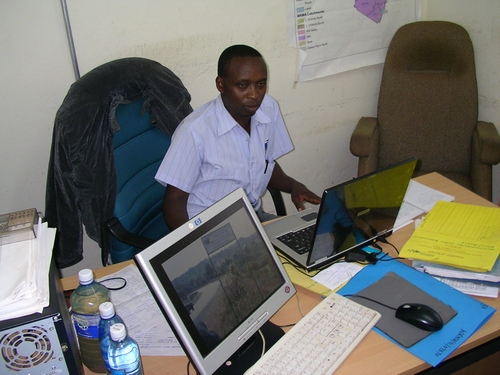
Zakayo @ work in his office (hey, you’ve just been blogged, dude :-)
Take my colleague Abdoulaye, for instance. He stays in Paris, France, works as a consultant in Frankfurt during the week and made the tragic mistake of buying a desktop-laptop three years ago. “Desktop-laptop”? Well, it’s an Asus Z8100 which comes with the same parts as a desktop computer, including the battery-eating cpu, a very loud fan, a horrible battery life and heavy weight. You wouldnt want to carry this machine around with you. Alas, this is exactly what he has done in the past. So we are in the process of getting him a better machine @ smaller size and made up plans how to set up his Asus Z8100 for use with his parents in (The) Senegal .
So there you are: an older computer at your hands that will be given to the extended family back home and the quest for a better operating system which *just* works.
With (a french version of) WinXP, we’ll sure find enough guys back home who’ll provide assistance in case of emergency and it will also be possible to connect a mobile phone to the computer (= inet access) with PC Suites that are available online from Nokia, Sony Ericsson and so on.
But then – there SURE will be someone unintentionally infecting the machine with malware and/or or things happening that will quickly kill productivity on this machine. The alternative?
The alternative could be a free and open (alternative) operating system – such as Ubuntu – but it lacks this out-of-box-experience to support a mobile phone and/or provide instant internet access. Also, it will be harder to find some local assistance in case of problems.
You see, there are currently many different Linux distros out there that all do a nice job of providing an interesting alternative – but which one of them provides this out-of-the-box-experience so that any average dude or dudette out there may just download a fresh copy, burn it to a CD, take an older computer, install it and give it to his/her family back home?
Something that will automatically setup a mobile phone to the machine (given that mobile phones / GPRS modems often are the only reliable way of accessing the inet in rural or peri-urban areas – provided that the area is covered with a wireless/gsm network); something that will automatically support most common desktop printers; something that will just work and provide a maximum connectivity and security even during power failures (no unstable file systems, that is).
This is why I think that initiatives like Ubuntu and or the general promotion of Free Open Source Software (FOSS) are much more important than giving out dedicated hardware to users because it’s the software that makes the difference, not hardware. And yes, the OLPC initiative is also nice + my understanding is that it was also developed to create some reverse-engineering spirit with the kids. But then – it’s still an investment whereby we – as end users – could just as well hand out normal hardware with an alternative OS. Think of your old laptop from 1999 and a copy of Edubuntu …
So…if YOU know of any free and open operating system that provides this flexibility and “Luser” -compatibility, pls feel free to drop a comment here so that we can all benefit. Thank you! :-)
This scenery…

…shall just remind me of peaceful Embu downtown.
If you watch closely enough, you can see a “promotion” going on at the left side of the road where two dudes tried to sell raffle tickets and promised some things like TV sets and other goods rural folks might be attracted to.
And then I arrived in Nairobi, it was starting to rain, there was a agonizing traffic jam and I felt hungry. 20 minutes waiting for a Matatu + fighting with other passengers over 20cm of space only to pay the rush-hour fare? Naaa…..
Java House downtown, I think, should be renamed “Jam Rescue 2”.

And yes, I was wrong: they DO have toothpicks at Java House.
AOB:
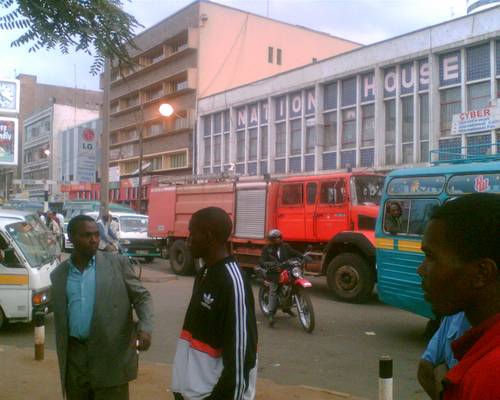
Just WHO still wants to have a fire brigade downtown? This fire truck took about 5 minutes to get out of its garage and drive to this spot (~ 20m away from the brigade) only to be stuck in a typical Nairobi rush-hour traffic jam.

Anyone still in need of some last minute christmas presents?
Don’t look any further – this inflatable mzee krissimassi goes for 50 bob, the bigger one for 100 bob.
Nairobi. I somehow love this place.
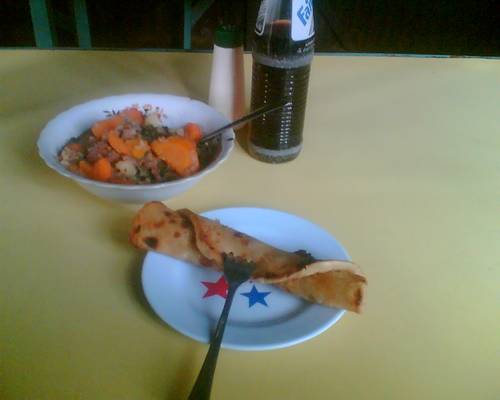
Sukuma + some meat: 30 /=
plain Chapati: 10 /=
Soda dogo : 20 /=
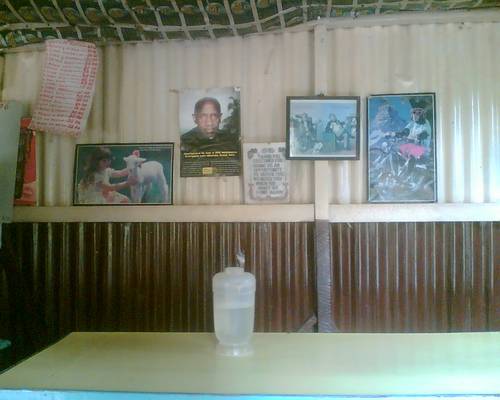
A beautiful view on *kitsch* signboards with strange messages: priceless :-)
—-
Remember this post on the matope infested road to our office?

Well, sijui if its for the judge who lives there, but the city town council of Embu today decided to *eventually* do something about it. Atereere…
So you’re passing through Mwea and see a woman selling rice. And look, there’s another one selling rice. And another one. And another one. And another one. And another one. And another one. And another one. And another one. And….
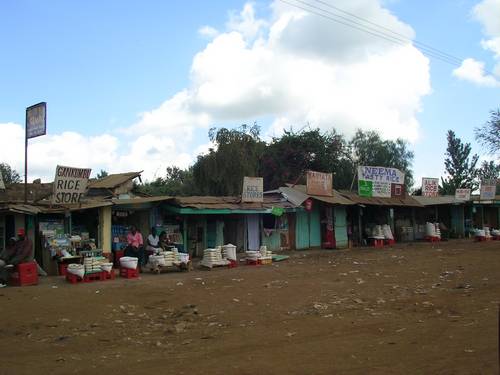
“Waititu”, I asked my colleague the other day, “why are aaaaaalllllll these people selling rice? I mean, isn’t this confusing for customers? Now where do I buy my rice? Which is the best place?”
“Oh, customers just buy their rice at one shop and then, if they like it, they just return to the same shop next time they’re in need of rice. This is the way we do it in Kenya.”
Aha.
And then you’re proceeding towards Embu, where your next small step is to get at least one of those computers at the office online. The typical landline modem dial-in connection is just too slow, and you’ve thought about connecting one of the mobile phones of your colleagues to a computer via a data caboooool and going online using the GPRS (packet data) method. These guys need to be connected and are supposed to check their emails at least once a day.
You’re taking a matatu to Nairobi and buy one of those data cables. The cable works…..sometimes…..sometimes it doesn’t, and you just wish someone at the HQ who procured all these fancy computers could be around for some serious talks:
Of course none of those ******** TOSHIBA notebooks (hi M :-) comes with an InfraRed port. Please, the person in charge of procurement at the HQ should be sacked for blatant stupidity.
Now since the cable isn’t that reliabooool, and since it somehow “walked away” (= someone took it), you think of the next best solution of connecting a mobile phone to a computer: InfraRed. Or as we pronounce it here in this area: InflaLed.
You’re taking another matatu to Nairobi and strike a deal by just spending Ksh. 1.000/= on an imported InfraRed / USB to serial adapter. A small device that provides an InfraRed port on your computer via the USB port.
You’re back at the office, connect it to a computer, and realize it doesn’t work.
“Hmmm”, you’re thinking to yourself, “now that’s Murphy’s Law. Will I be able to find an InfraRed port here in Embu that JUST works?”.
Good question, eh?
There are about 5 good shops selling a variety of interesting mobile phones – and about 20 smaller shops selling just the usual, fast-selling & low-budget mobile phones.
There are about 20 electricoooool shops selling tv sets, tv sets, tv sets, tv sets, radios, cassette players, cd stereo systems, tv antennas, solar panels and car batteries.
Is there ANY shop in Embu that sells computer spare parts? Something like hard disks, mainboards, computer cases, RAM, CPUs, optical drives, USB stuff, etc.?
No! Nothing.
And I ask you: why not? How come that computer parts are even cheaper in Nairobi than in e.g. Berlin, yaani here in this town upcountry – where people are also using computers, just as the two leading supermarkets in town are also using computerized barcode scanning cashier systems – there’s not a single shop where you can buy such parts.
There’s a market, there are customers, and there’s is money. Alafu…..?